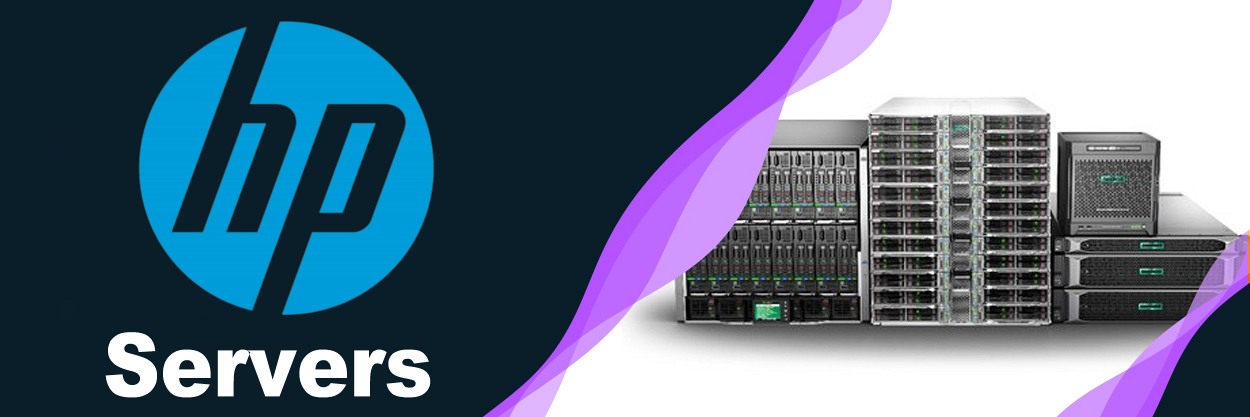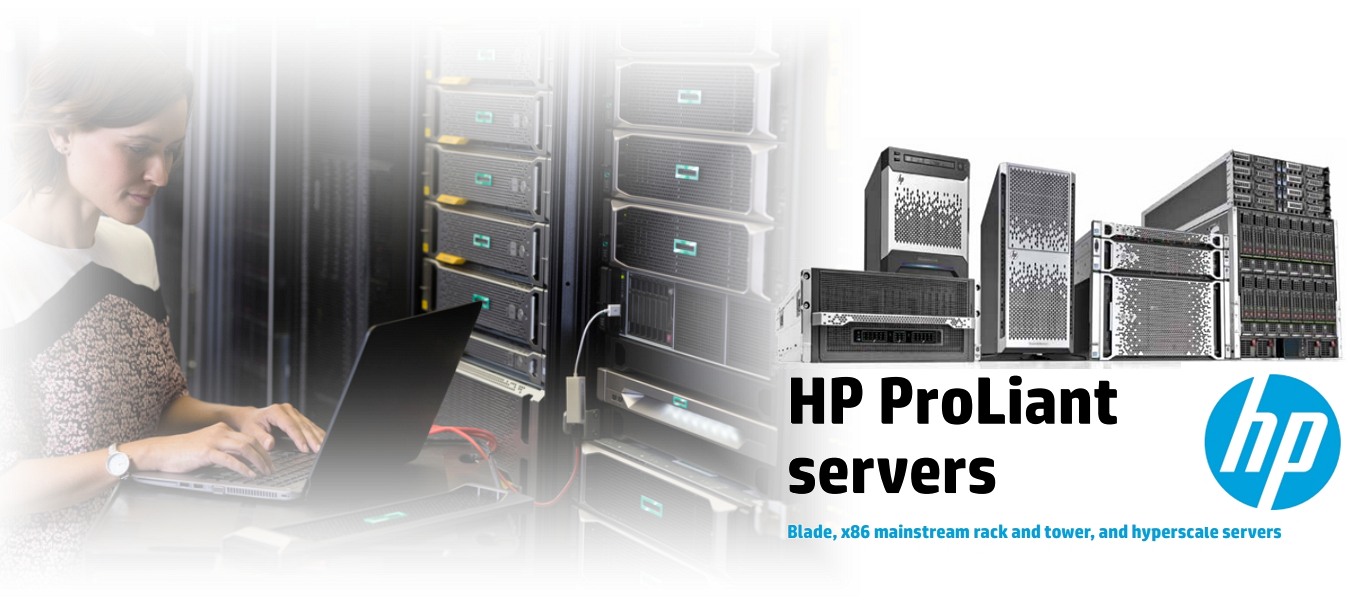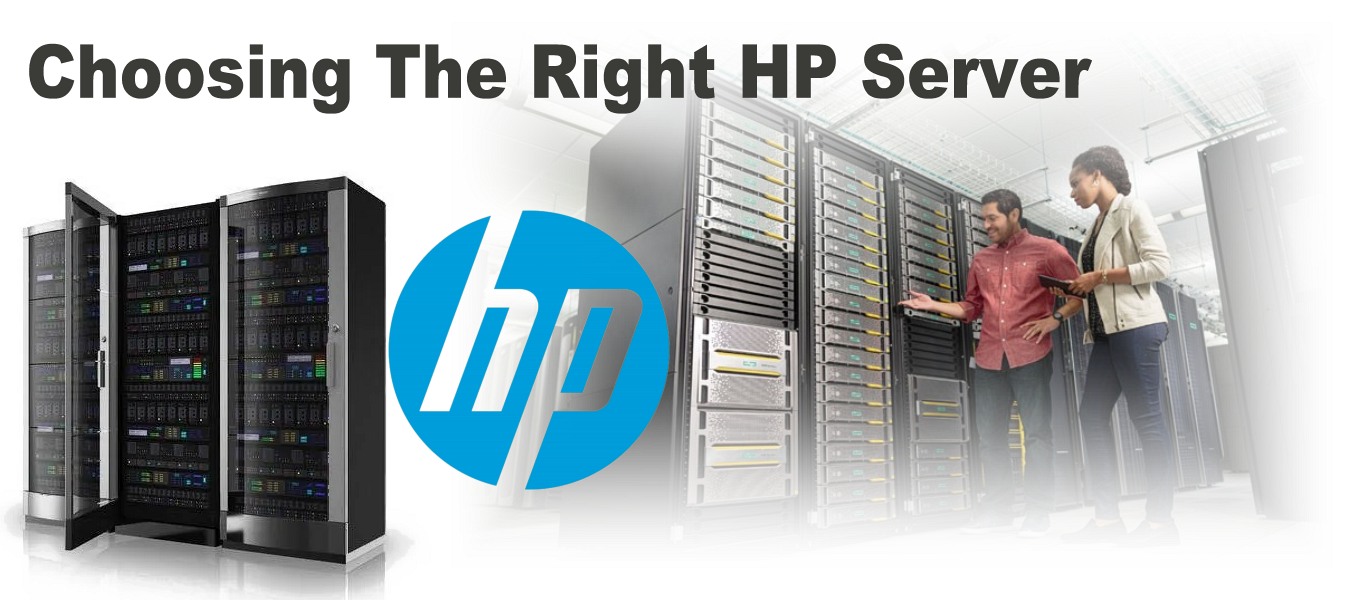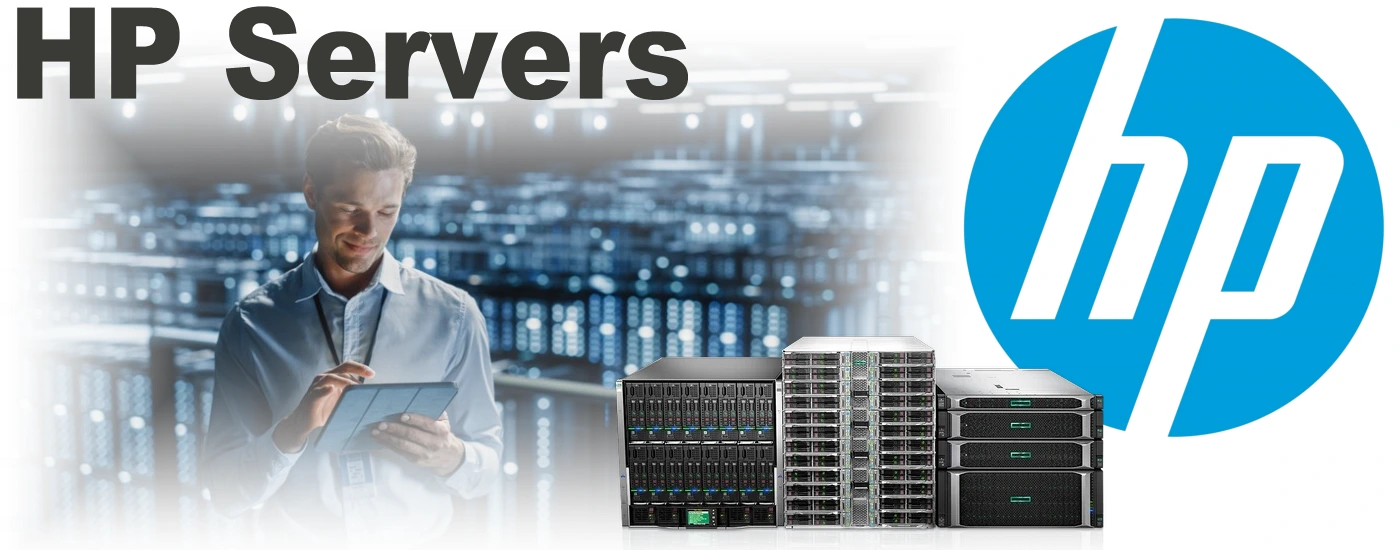HP Server Dubai
Hewlett-Packard (HP) servers are a line of enterprise-grade hardware designed to support a wide array of workloads in different types of organizations, from small businesses to large data centers. Over the years, HP has developed a reputation for creating robust, scalable, and high-performing server solutions, currently branded under HPE (Hewlett Packard Enterprise) following the split of HP Inc. and Hewlett Packard Enterprise in 2015. Their servers are widely recognized for their versatility, performance, and management capabilities, making them highly sought-after in various IT environments.
One of the core features of HP servers in Dubai is their ability to meet a variety of workloads. They offer a broad spectrum of server types, including rack, tower, blade, and hyper-converged infrastructure solutions, each with unique advantages tailored to specific needs. These servers are designed to handle everything from simple file storage to complex virtualized environments, big data applications, AI, and machine learning workloads. This versatility ensures that organizations can select a server model that meets both their current and future needs without investing in completely new infrastructure as requirements evolve.
Performance is at the heart of HP server technology. The servers are equipped with cutting-edge processors, including Intel Xeon and AMD EPYC, which deliver high-speed computing power for processing-intensive tasks. Combined with support for large amounts of RAM and high-throughput storage solutions, HP servers are capable of handling data-intensive applications, including large databases, real-time analytics, and high-performance computing (HPC). This focus on performance allows HP servers to serve both compute-heavy applications and low-latency environments, making them suitable for diverse applications like scientific research, financial transactions, and media processing.

hp server dubai
The scalability of HP servers is another key advantage. Organizations often face growing data and performance demands, which require infrastructure capable of scaling efficiently. HP’s modular design philosophy enables organizations to easily expand their computing resources by adding more storage, memory, or even entire server units. This modularity ensures that as business needs change, organizations can adapt without significant disruptions to their infrastructure. This scalability is particularly advantageous for companies experiencing rapid growth or those in sectors where workloads can fluctuate, such as retail or cloud service providers.
HP’s integrated management tools offer a major advantage in server operations and administration. HPE offers a management platform called HPE Integrated Lights-Out (iLO), which provides administrators with comprehensive control over servers, even remotely. This tool enables IT teams to monitor system health, manage power consumption, configure settings, and receive alerts for potential issues. In essence, iLO makes server management simpler, more efficient, and safer, as administrators can address many common issues without needing physical access to the server. Remote management capabilities reduce downtime and improve the responsiveness of IT departments, which is essential in organizations with a lean IT staff or locations spread across multiple geographies.
Security is another area where HP servers excel. In today’s environment, where cybersecurity threats are continually evolving, ensuring that servers are secure is crucial. HP servers integrate a variety of security features designed to protect data and infrastructure. For example, HPE offers “Silicon Root of Trust” technology, which ties security directly to the hardware level, protecting against firmware attacks and other vulnerabilities that are difficult to address through software alone. In addition to hardware-based protections, HP servers support secure boot and advanced encryption standards, which ensure that only authorized software is allowed to run and that data is protected both in transit and at rest. This strong focus on security gives organizations confidence that their critical data is well-protected, an essential factor for industries like healthcare, finance, and government.
Energy efficiency and sustainability are significant concerns for modern organizations, and HP servers are designed to address these. As data centers continue to grow in size and power consumption, energy efficiency becomes a significant operational cost factor. HP servers incorporate technologies aimed at reducing power usage, such as HPE’s “Power Discovery Services,” which help optimize power allocation and minimize waste. They also support dynamic power capping, which automatically adjusts power usage based on demand, ensuring that resources aren’t wasted during low-demand periods. These features contribute to a lower total cost of ownership (TCO) and a smaller environmental footprint, aligning with the sustainability goals of many modern organizations.
HP’s commitment to hybrid IT and cloud integration has also made its servers popular in recent years. As more businesses embrace hybrid environments that mix on-premises and cloud infrastructure, HP servers are designed to integrate smoothly with cloud solutions, including those from major providers like Microsoft Azure and Amazon Web Services (AWS). HPE GreenLake, a hybrid IT offering, allows organizations to operate their on-premises HP servers in a cloud-like manner, where they pay only for the resources they use. This approach provides the scalability and flexibility of the cloud while keeping critical data on-premises. HP’s cloud integration capabilities offer an ideal balance for organizations that need the flexibility of cloud computing but want to maintain control over their data for security or regulatory reasons.
Reliability and durability are essential features for any server, and HP servers have been known for their robustness. They are designed to handle high-intensity operations over extended periods without faltering, which is critical for businesses that cannot afford downtime. HP servers undergo rigorous testing processes to ensure that they meet high standards for reliability and durability, and they are backed by a strong support network and warranty programs. This focus on durability helps minimize the likelihood of hardware failures, ensuring that businesses can maintain operational continuity and avoid costly disruptions.
Another significant advantage is the support ecosystem available for HP servers. HPE offers a comprehensive suite of support services, including on-site support, warranty extensions, and proactive care services that include predictive analysis and preemptive problem-solving. The availability of dedicated support personnel and resources ensures that organizations can quickly resolve any issues that arise. HP also offers extensive documentation, community forums, and knowledge bases, which allow IT teams to troubleshoot and optimize their server performance effectively. This support ecosystem helps companies maintain high levels of uptime, which is crucial for industries where downtime can have significant financial implications.
HP servers also offer a high degree of customization, which allows organizations to tailor their infrastructure to meet specific requirements. This is particularly beneficial for industries with unique needs, such as telecommunications or scientific research, where specialized configurations are often required. HP provides options for customization in terms of processor choice, memory, storage type, network connectivity, and more. This flexibility ensures that HP servers can fit into virtually any infrastructure setup, from small business networks to large-scale enterprise data centers.
The flexibility and reliability of HP servers extend to virtualization and containerization support, which is becoming increasingly important in modern IT. HP servers are designed to handle virtualized workloads efficiently, allowing organizations to run multiple virtual machines on a single physical server, which helps maximize resource utilization and reduce hardware costs. The servers are compatible with popular virtualization platforms like VMware, Microsoft Hyper-V, and KVM. Furthermore, as organizations shift towards containerized environments, HP servers provide optimal performance for container platforms like Docker and Kubernetes, supporting the seamless deployment and scaling of applications.

HP SERVERS UAE
The investment in an HP server also includes an emphasis on automation, which allows organizations to reduce the administrative burden on IT teams. With HPE OneView, administrators can automate various management tasks, such as deployment, updates, and configuration, which streamlines IT operations and reduces the likelihood of human error. Automation simplifies complex tasks and increases operational efficiency, freeing IT staff to focus on more strategic projects. In environments with large-scale server deployments, the automation capabilities of HP servers significantly enhance productivity and operational speed, leading to better overall performance and resource utilization.
Lastly, HP servers are known for their compatibility and interoperability with third-party solutions, which is critical for organizations with diverse IT ecosystems. HP works closely with other technology vendors to ensure that its servers integrate seamlessly with different operating systems, databases, applications, and storage solutions. This compatibility enables organizations to avoid vendor lock-in, giving them the flexibility to work with a wide array of tools and technologies. The interoperability of HP servers with different technologies is particularly beneficial for large enterprises with complex infrastructure needs, as it allows them to create a cohesive and adaptable IT environment.
In summary, HP servers in Dubai bring a robust set of advantages to the table, from performance, scalability, and security to energy efficiency, cloud compatibility, and strong support services. Their design caters to diverse workloads, enabling organizations of all sizes and types to leverage reliable, high-performance computing resources that can adapt to their changing needs. With a focus on remote management, automation, and integration, HP servers simplify the management of IT infrastructure, making them a valuable asset for modern enterprises looking to enhance operational efficiency, control costs, and maintain high levels of security. Their durability and support ecosystem ensure minimal downtime, and the emphasis on energy efficiency and sustainability aligns with the growing need for environmentally responsible technology solutions. Overall, HP servers are a comprehensive and adaptable choice for organizations seeking to future-proof their IT infrastructure.
Choosing the Right HP Servers in Dubai
Choosing the right HP server requires an understanding of an organization’s specific workload needs, budget, and future scalability requirements. Hewlett-Packard Enterprise (HPE) offers a range of servers designed to support diverse environments, from small businesses with modest IT requirements to large enterprises running complex applications. HP servers are known for their reliability, performance, and flexibility, which makes selecting the right model a critical decision for long-term infrastructure success.
To make the best choice, organizations must evaluate a few essential factors: workload requirements, scalability, performance, manageability, energy efficiency, and budget. Each HP server type is designed to meet different needs, so understanding the primary types and their unique features is a crucial first step.

hp server supplier dubai
Factors to Consider When Choosing an HP Server
- Workload Requirements: The first step in selecting an HP server is to assess the type of workload the server will handle. For example, small businesses may require a server for basic tasks like file storage and hosting applications, while larger enterprises might need servers capable of handling virtualization, AI, and large databases. HP offers different servers to cater to workloads ranging from simple tasks to compute-intensive applications.
- Scalability Needs: If the organization anticipates future growth or fluctuations in demand, scalability is an important consideration. HP servers are modular and offer scalable configurations, allowing organizations to expand storage, memory, and processing power as needed without significant downtime.
- Performance Requirements: The processing power of a server is often determined by the types of CPUs (like Intel Xeon or AMD EPYC) and the amount of memory it supports. Organizations should consider their performance needs based on whether the server will handle simple file-sharing or complex analytics and AI workloads.
- Management and Monitoring Capabilities: HP’s management tools, such as the Integrated Lights-Out (iLO) interface and HPE OneView, provide robust server monitoring and management, which is particularly important for IT departments managing multiple servers. Organizations with remote or distributed IT setups might benefit from servers with strong remote management features.
- Energy Efficiency: For organizations conscious of their energy consumption, choosing energy-efficient servers can significantly reduce operational costs over time. HP servers are designed with energy-saving technologies like dynamic power capping, which can automatically adjust power usage based on workload demands.
- Budget: Cost is always a factor, and HP offers servers across various price points. Organizations should weigh initial costs against the server’s performance, scalability, and potential savings over time.
Types of HP Servers
HP provides several server families, each tailored to different use cases, ranging from entry-level servers for small businesses to high-performance solutions for enterprise-level data centers.
1. HPE ProLiant DL Series (Rack Servers)
The HPE ProLiant DL series is a popular line of rack-mounted servers designed for data centers and organizations requiring centralized computing resources. Rack servers are compact, saving valuable physical space, and allow for easy stacking in server racks. The ProLiant DL series servers are versatile and capable of supporting a wide range of applications, making them ideal for virtualization, data analytics, and web applications.
Key benefits of ProLiant DL servers include:
- High Density: Being rack-mounted, these servers save space and provide powerful performance in a compact form.
- Scalability: They offer flexible configurations, allowing organizations to add more processing power, storage, or memory as needed.
- Management Tools: Integrated iLO technology and compatibility with HPE OneView make management efficient.
2. HPE ProLiant ML Series (Tower Servers)
The HPE ProLiant ML series comprises tower servers suitable for small to medium-sized businesses and remote offices. Unlike rack servers, tower servers are larger and do not require a rack for installation, which makes them ideal for organizations with limited IT infrastructure. The ML series is often used in office environments where space is not a significant concern, and they are quieter than rack servers, making them more suitable for in-office deployment.
Key advantages of ProLiant ML servers include:
- Ease of Use: These servers are easy to set up and manage, even without specialized IT staff.
- Scalability: They support a wide range of configuration options and can be upgraded as the organization grows.
- Cost-Effective: Tower servers are typically more affordable than rack or blade servers, making them ideal for budget-conscious businesses.
3. HPE ProLiant MicroServer Series
The HPE ProLiant MicroServer is designed for small businesses, home offices, or organizations needing a low-power, compact server. These servers are smaller than tower servers and are designed for low-intensity workloads, like file storage, basic application hosting, and collaboration tools. They provide entry-level server functionality with an emphasis on simplicity and cost-effectiveness.
Key advantages of the MicroServer series:
- Compact Design: MicroServers are small and can fit in office spaces without dedicated IT rooms.
- Low Power Consumption: They are energy-efficient, reducing operational costs.
- Affordability: MicroServers are among the most cost-effective options, suitable for startups and small businesses.
4. HPE Synergy (Composable Infrastructure)
HPE Synergy represents HP’s composable infrastructure offering, designed for enterprises requiring a dynamic infrastructure that adapts to diverse and changing workloads. Composable infrastructure allows businesses to allocate computing, storage, and networking resources on-demand, which is ideal for organizations with mixed or unpredictable workloads.
Key benefits of HPE Synergy include:
- Flexibility: Resources can be composed and recomposed based on workload needs, providing agility and adaptability.
- Efficiency: Synergy reduces hardware underutilization, making it a cost-efficient solution for large enterprises.
- Integrated Management: HPE Synergy comes with HPE OneView, which provides streamlined management of the infrastructure, enhancing operational efficiency.
5. HPE Apollo (High-Performance Computing)
The HPE Apollo series is designed for high-performance computing (HPC) environments, which require immense processing power. Apollo servers are optimized for data-intensive workloads, including AI, machine learning, big data analytics, and scientific research. They provide high compute density, which is essential for organizations needing powerful computing in a compact footprint.
Key features of the Apollo series include:
- High Density and Performance: Apollo servers are designed to deliver exceptional performance in a compact form factor.
- Efficient Cooling: The Apollo series uses advanced cooling technology to support high-performance components.
- Scalability: Apollo servers support large amounts of RAM and high-speed networking, ideal for compute-intensive applications.
6. HPE Superdome Flex (Mission-Critical Applications)
The HPE Superdome Flex series is tailored for mission-critical applications where reliability and scalability are essential. These servers support in-memory computing, making them ideal for real-time analytics, large databases, and applications requiring high resilience. Superdome Flex servers are also optimized for big data and enterprise resource planning (ERP) applications.
Key benefits of the Superdome Flex series include:
- Reliability: Designed with advanced error correction and redundancy features, these servers ensure high availability.
- Scalability: Superdome Flex can scale to thousands of cores and terabytes of memory, meeting the needs of the most demanding applications.
- Data Integrity: These servers are built to handle mission-critical data, ensuring data consistency and reliability for sensitive applications.
7. HPE Moonshot (Specialized Applications)
The HPE Moonshot series is a unique line of servers designed for specialized, high-density applications like VDI (Virtual Desktop Infrastructure), web hosting, and edge computing. Moonshot servers are optimized for specific workloads and are more efficient than general-purpose servers in these applications.
Key features of the Moonshot series include:
- Application-Specific Optimization: Moonshot servers are purpose-built to run specific types of applications more efficiently.
- High Density and Low Power: These servers support high-density deployments with minimal power consumption, reducing operational costs.
- Scalability for Targeted Workloads: Moonshot servers are designed to scale efficiently for specific use cases, such as web hosting or virtual desktops.
Summary of Choosing the Right HP Server
When selecting an HP server, organizations should carefully assess their workload needs, scalability requirements, and budget constraints. The HPE ProLiant DL series provides versatility and performance for general-purpose data center workloads, while the ML series offers a tower-based solution for small to medium-sized businesses. The MicroServer series is suited for entry-level server requirements, and the Synergy line offers a composable infrastructure for mixed workloads. For high-performance computing, the Apollo series is ideal, while Superdome Flex serves mission-critical, large-scale applications. Finally, the Moonshot series caters to highly specialized, high-density applications.


